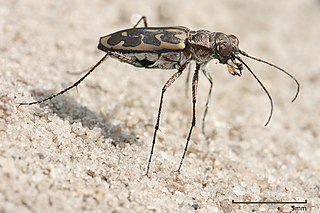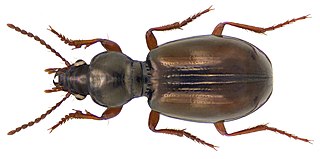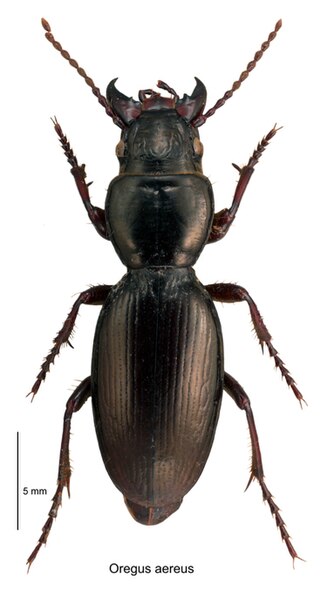
Tiger beetles are a family of beetles, Cicindelidae, known for their aggressive predatory habits and running speed. The fastest known species of tiger beetle, Rivacindela hudsoni, can run at a speed of 9 km/h, or about 125 body lengths per second. As of 2005, about 2,600 species and subspecies were known, with the richest diversity in the Oriental (Indo-Malayan) region, followed by the Neotropics. While historically treated as a subfamily of ground beetles (Carabidae) under the name Cicindelinae, several studies since 2020 indicated that they should be treated as a family, the Cicindelidae, which are a sister group to Carabidae within the Adephaga.

Ground beetles are a large, cosmopolitan family of beetles, the Carabidae, with more than 40,000 species worldwide, around 2,000 of which are found in North America and 2,700 in Europe. As of 2015, it is one of the 10 most species-rich animal families. They belong to the Adephaga. Members of the family are primarily carnivorous, but some members are phytophagous or omnivorous.

Calathus is a genus of ground beetle native to the Palearctic, the Near East and North Africa. There are at least 190 described species in Calathus.

Mecodema is a genus of large flightless ground beetle (Carabidae) endemic to New Zealand. The genus is very diverse in comparison to the other three New Zealand genera within the subtribe Nothobroscina. Mecodema is geographically widespread across both the North and South Islands, as well as numerous offshore islands, including the Three Kings Is., Poor Knights Is., Aotea and Hauturu, Kapiti Is., Stephens Is., Stewart Is., Chatham Is., Snares Is.
Herbert Edward Andrewes was a stockbroker and an English entomologist who specialised in beetles of the order Coleoptera.

Miscodera arctica is a species of beetles in the family Carabidae, the only species in the genus Miscodera. It is circumpolar in distribution, predominantly northern, with outliers in New Hampshire and Maine in the continental U.S. Its relationships have been long disputed. Here it is placed in subfamily Broscinae. While it certainly belongs to the more advanced ground beetles, it was alternatively placed in the subfamily Trechinae.

Carabinae is a subfamily of ground beetles in the family Carabidae. There are about 10 genera and more than 1,400 described species in Carabinae.
Rhysodinae is a subfamily in the family Carabidae. There are 19 genera and at least 380 described species in Rhysodinae. The group of genera making up Rhysodinae had been treated as the family Rhysodidae in the past, and subsequent DNA analysis then placed it within Carabidae, where it was sometimes treated as the tribe Rhysodini, but the most recent analyses place it as a subfamily in a clade along with subfamilies Paussinae and Siagoninae, forming a sister to the remaining Carabidae.
Grouvellina is a genus of beetles in the family Carabidae, containing the following species:

Rhyzodiastes is a genus of beetles in the family Carabidae, containing the following species:

Tangarona is a genus of wrinkled bark beetles in the family Carabidae. Tangarona pensa, found in New Zealand, is the only species of this genus.
Arrowina is a genus of wrinkled bark beetles in the family Carabidae. The genus occurs in Asia, with records from at least Sri Lanka, southern India, Nepal, Thailand, Sumatra (Indonesia), and Japan.

Omoglymmius is a genus of wrinkled bark beetles in the subfamily Rhysodinae, found on every continent except Africa and Antarctica. There are at least 150 species in Omoglymmius.
Shyrodes is a genus of wrinkled bark beetles in the family Carabidae. There are at least two described species in Shyrodes.
Srimara is a genus of wrinkled bark beetles in the family Carabidae. Srimara planicollis, found in Vietnam, is the only species of this genus.
Xhosores is a genus of wrinkled bark beetles in the family Carabidae. Xhosores figuratus, found in South Africa, is the only species of this genus.
Yamatosa is a genus of wrinkled bark beetles in the family Carabidae, found in Asia.

Kaveinga is a genus of wrinkled bark beetles in the family Carabidae.

Ross Taylor Bell was an American entomologist with particular interest in the invertebrate natural history of Vermont, United States, and carabid beetles. Together with his wife, Joyce Bell, his work at the University of Vermont was largely taxonomic, where they described more than 75% of the rhysodine species known to science. Ross also wrote a number of seminal papers in his chosen field.

Nothobroscina Roig-Juñent 2000 is one five subtribes within the ground beetle tribe Broscini. The subtribe consists of ten genera from the Gondwanan countries: Australia, New Caledonia, New Zealand and southern South America. All of the genera are endemic to their type country, i.e., none of the genera are shared across any of the Gondwanan countries.











